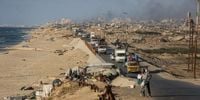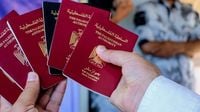On August 18, 2025, the Trump administration delivered a sweeping and controversial blow to Palestinians seeking entry to the United States, suspending nearly all visitor visas for those holding Palestinian Authority passports. The move, first reported by The New York Times and later corroborated by The Wall Street Journal and other outlets, marks a significant escalation in U.S. policy toward Palestinians, affecting everything from medical travel and university studies to family visits and business trips.
The decision was communicated through a cable sent to U.S. embassies and consulates worldwide, instructing consular officers to invoke section 221(g) of the Immigration and Nationality Act. According to the cable, as cited by The Wall Street Journal, "Effective immediately, consular officers are instructed to refuse under 221(g) of the Immigration Nationality Act (INA) all otherwise eligible Palestinian Authority passport holders using that passport to apply for a nonimmigrant visa." The instruction leaves little room for ambiguity: nearly all Palestinians who rely on their Palestinian Authority passports are now barred from obtaining visitor visas to the United States.
For many Palestinians, this abrupt change is more than just a bureaucratic hurdle—it’s a deeply personal blow. Lafi Adeeb, mayor of Turmus Ayya in the West Bank, told The New York Times, "It feels like Palestinians are always treated in an unjust way." The sentiment resonates among countless families now facing uncertainty about accessing medical care, pursuing educational opportunities, or reuniting with loved ones in the U.S.
The restrictions are broad. They apply not only to residents of Gaza—a region already under intense scrutiny and travel limitations—but also to Palestinians in the West Bank. The new policy effectively halts visas for medical treatment, university studies, visits to relatives, and business travel. Even high-profile officials, including Palestinian Authority President Mahmoud Abbas, are not exempt. The administration’s move means that Abbas and other senior Palestinian officials are barred from attending the United Nations General Assembly in New York, scheduled for September 2025.
President Abbas’s office responded with a statement expressing "deep regret and astonishment" at the decision, urging the U.S. administration to "reconsider and reverse" the move, as reported by The New York Times. The timing is particularly notable: under the United Nations host-country agreement, the U.S. is generally expected to issue visas to officials attending the General Assembly. The State Department, however, maintains that it is in compliance by allowing the Palestinian mission to participate, even as individual officials are denied entry.
The U.S. State Department offered a clear rationale for the sweeping restrictions. In a statement quoted by The New York Times, the department said, "The Trump administration has been clear: it is in our national security interests to hold the PLO and PA accountable for not complying with their commitments, and for undermining the prospects for peace." The statement reflects a hardening U.S. stance toward Palestinian leadership, with officials emphasizing that the move is intended to exert pressure for political change.
Notably, the visa suspension does not apply to Palestinians who hold foreign passports or those who already possess valid U.S. visas. As The New York Times clarified, the decision impacts only those relying solely on Palestinian Authority passports. For many, however, dual citizenship is not an option, and the new rules represent a near-total ban on legal entry to the U.S.
Former U.S. officials have described the policy as an effective blanket rejection. Hala Rharrit, a former State Department spokeswoman, told The New York Times, "It’s an open-ended refusal." The language of the August 18 cable, as reviewed by The Wall Street Journal, leaves little doubt: the directive is meant to be comprehensive and immediate.
The broader context of the decision is equally significant. The visa suspension comes at a time when several U.S. allies have declared their intention to recognize a Palestinian state, putting additional diplomatic pressure on Washington. Meanwhile, the U.S. has continued to support Israel in its ongoing conflict with Hamas, even as international criticism has mounted over humanitarian concerns in Gaza. The new visa policy, then, is seen by many as part of a series of steps by the Trump administration to further isolate Palestinian leadership and limit their international engagement.
For Palestinians who had hoped to travel to the United States for urgent reasons—such as life-saving medical care or academic scholarships—the impact is devastating. The stories are as varied as they are heartbreaking: students who received acceptance letters from U.S. universities now find themselves unable to attend; patients with appointments at American hospitals are left in limbo; families planning reunions are forced to cancel long-anticipated visits. The immediate effect is one of uncertainty and frustration, with many wondering if or when the policy might be reversed.
American diplomats have been given clear instructions. As The New York Times and The Wall Street Journal both confirmed, consular officers are to refuse all otherwise eligible Palestinian Authority passport holders applying for nonimmigrant visas. The directive is unequivocal, signaling a dramatic shift in U.S. policy that could have lasting repercussions for Palestinian-American relations.
The move has also drawn attention to the complexities of U.S. immigration law. Section 221(g) of the Immigration and Nationality Act allows consular officers to refuse visas when an application is incomplete or when additional information is required. In this case, however, the provision is being used as a blanket measure to deny visas to an entire population based on their passport alone. Legal experts and human rights advocates have questioned the justification for such a broad application, warning that it sets a troubling precedent for collective punishment.
While the Trump administration has not provided a detailed public explanation beyond its stated national security concerns, critics argue that the policy will do little to advance peace or security in the region. Instead, they contend, it risks deepening resentment and further isolating ordinary Palestinians from the international community. Supporters of the administration’s approach, on the other hand, argue that holding the Palestinian leadership accountable is a necessary step to force meaningful negotiations and reform.
As the dust settles from the August 18 announcement, one thing is clear: the suspension of nearly all visitor visas for Palestinian passport holders represents a watershed moment in U.S.-Palestinian relations. Whether it will achieve its stated aims or simply exacerbate existing tensions remains to be seen, but for now, the doors to America are firmly closed to most Palestinians seeking to visit, study, or seek care on U.S. soil.
In the weeks and months ahead, the world will be watching to see how this policy shapes the lives of Palestinians and the broader dynamics of Middle East diplomacy. For those directly affected, the consequences are immediate and deeply personal—a stark reminder of how quickly the tides of international politics can turn.



